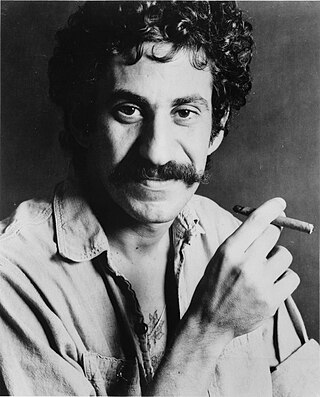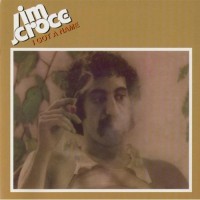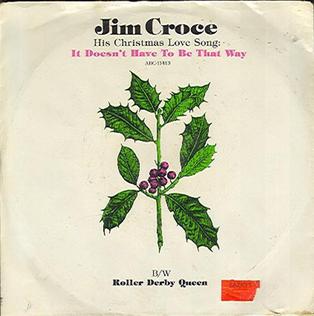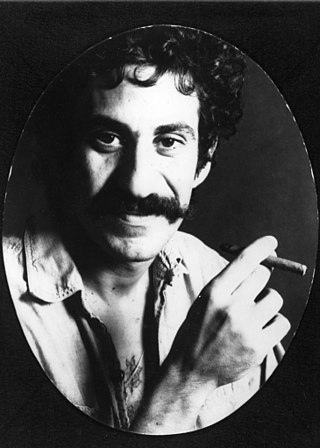
James Joseph Croce was an American folk and rock singer-songwriter. Between 1966 and 1973, he released five studio albums and numerous singles. During this period, Croce took a series of odd jobs to pay bills while he continued to write, record and perform concerts. After Croce formed a partnership with the songwriter and guitarist Maury Muehleisen in the early 1970s, his fortunes turned. Croce's breakthrough came in 1972, when his third album, You Don't Mess Around with Jim, produced three charting singles, including "Time in a Bottle", which reached No. 1 after Croce died. The follow-up album Life and Times included the song "Bad, Bad Leroy Brown", Croce's only No. 1 hit during his lifetime.

I Got a Name is the fifth and final studio album and first posthumous release by American singer-songwriter, Jim Croce, released on December 1, 1973. It features the ballad "I'll Have to Say I Love You in a Song", which reached number 9 in the US singles chart, and the ballad "Salon and Saloon", the last song Croce recorded in his lifetime. The song, which is noted for its sparse piano-only vocal backing, was written by his guitarist and friend Maury Muehleisen and was included on the album as a gift to the writer.

Tony Booth is an American country music singer who participated in Buck Owens' "Bakersfield sound" revolution.

"I'm Easy" is an Academy Award-winning song written and performed by Keith Carradine for the 1975 movie Nashville. Carradine recorded a slightly faster version that became a popular music hit in 1976 in the United States.

"Chain Gang" is a song by American singer-songwriter Sam Cooke, released as a single on July 26, 1960.

"Bad, Bad Leroy Brown" is an uptempo, strophic story song written by American folk rock singer Jim Croce. Released as part of his 1973 album Life and Times, the song was a No. 1 hit for him, spending two weeks at the top of the Billboard Hot 100 in July 1973. Billboard ranked it as the No. 2 song for 1973.

"Time in a Bottle" is a song by singer-songwriter Jim Croce. He wrote the lyrics after his wife Ingrid told him she was pregnant in December 1970. It appeared on Croce's 1972 ABC debut album You Don't Mess Around with Jim and was featured in the 1973 ABC made-for-television movie She Lives! After he was killed in a plane crash in September 1973, the song was aired frequently on radio, and demand for a single release built. The single of "Time in a Bottle" became Croce's second, and final track to reach number one in the United States.
"Wedding Bell Blues" is a song written and recorded by Laura Nyro in 1966. The best known version was a number one hit for the 5th Dimension in 1969.

"Mockingbird" is a 1963 song written and recorded by Inez and Charlie Foxx, based on the lullaby "Hush, Little Baby".

"I'm Just a Singer (In a Rock and Roll Band)" is a 1973 hit single by the English progressive rock band the Moody Blues, written by the band's bassist, John Lodge. It was first released in 1972 as the final track on the album Seventh Sojourn and was later released as a single in 1973, with "For My Lady" as its B-side. It was the second single released from Seventh Sojourn, with the first being "Isn't Life Strange", which was also written by Lodge.

Steve Wariner is an American country music singer, songwriter and guitarist. His discography comprises nineteen studio albums, six compilation albums, and fifty-five singles. Of his studio albums, three are certified gold by the Recording Industry Association of America (RIAA) for shipments of 500,000 copies each: 1991's I Am Ready, and Burnin' the Roadhouse Down and Two Teardrops from 1998 and 1999 respectively. I Am Ready was Wariner's first release for Arista Nashville following tenures on RCA and MCA Nashville, and Burnin' the Roadhouse Down his first for Capitol Records.

"I'll Have to Say I Love You in a Song" is the title of a posthumously released single by the American singer-songwriter Jim Croce. The song was written by Croce and was originally released on his album I Got a Name.

"You Don't Mess Around with Jim" is a 1972 strophic story song by Jim Croce from his album of the same name. It was Croce's debut single, released on ABC Records as ABC-11328. ABC Records promotion man Marty Kupps took it to KHJ 930 AM in Los Angeles, CA where it first aired. It made the KHJ "30" chart that week of June 6, 1972. After spending 11 weeks on the Billboard Hot 100 chart, the song peaked at No. 8 the week ending September 9. Croce performed the song on American Bandstand on August 12, 1972. Billboard ranked it as the No. 68 song for 1972.

"Operator (That's Not the Way It Feels)" is a 1972 song written by Jim Croce. Croce's record was released on August 23, 1972. It was the second single released from Croce's album You Don't Mess Around with Jim. It reached a peak of number 17 on the Billboard Hot 100 in December 1972, spending twelve weeks on the chart.

"I Got a Name" is a 1973 single recorded by Jim Croce with lyrics by Norman Gimbel and music by Charles Fox. It was the first single from his album of the same title and also Croce's first posthumous single, released the day after his death in a plane crash on September 20, 1973. The song reached a peak of #10 on the Billboard Hot 100, spending 17 weeks on the chart. It also hit #3 on the Cash Box Top 100.

"It Doesn't Have to Be That Way" is a song written and recorded by Jim Croce for his 1973 album Life and Times. Originally released early that year as the B-side of the "One Less Set of Footsteps" single, it was reissued that December as the third and final single from the album as well as Croce's second posthumously-released single. It reached a peak of #64 on the Billboard Hot 100, spending five weeks on the chart.

Jim Croce was an American singer-songwriter with five studio albums and 12 singles to his credit. His posthumously-released fifth studio album was completed just prior to his 1973 death, and seven singles were also posthumously issued, one of which was "Time in a Bottle" from a previous album You Don't Mess Around with Jim. His popularity continued long after his death with the release of numerous compilation albums and "new" material being portioned out sporadically over the years. Three live albums, as well as a live DVD, have also been published.

Jerry Reed Sings Jim Croce is an album by American country singer Jerry Reed, released by RCA Records in 1980. The album is a tribute album for Jim Croce who died in 1973 in a plane crash during the peak of his career. Seven of the ten songs were singles released by Croce. The album peaked at number 56 on the Billboard country chart. The song "Age" was the only single released from the album. It peaked at 36 on the Billboard Hot Country Songs chart.

"Rock and Roll Heaven" is a song written by Alan O'Day and Johnny Stevenson, popularized by The Righteous Brothers. It is a paean to several deceased singers such as Jimi Hendrix, Janis Joplin, and Otis Redding, and has been rewritten a number of times to include other singers. The song was first recorded by the band Climax in 1973, but it failed to chart. It was then covered by The Righteous Brothers in 1974 and reached number three on the U.S. Billboard Hot 100.

"Ooh Poo Pah Doo" is a song written and performed by Jessie Hill. It was arranged and produced by Allen Toussaint. The single reached No. 3 on the Billboard R&B chart and No. 28 on the Hot 100 in 1960 although the charts list the B-side, instrumental "Ooh Poo Pah Doo - Part II", as the hit.



















